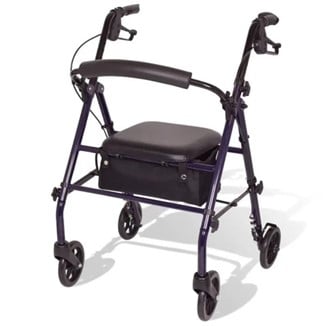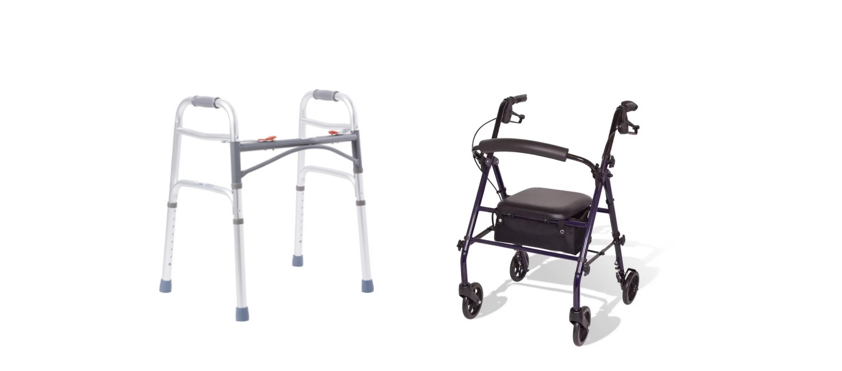When it comes to getting the right mobility aid we’re bombarded with different choices, It can get quite a confusing and energy-draining process. While this process can get frustrating, there are various mobility aids available in the market to make your daily life easier. Two popular option from those is “Walkers” & “Rollators”. In this blog, we’ll experience the differences between these two mobility aids and provide some helpful tips to help you pick the right device to fulfill your needs. Whether you’re considering a walker or a rollator for yourself or a loved one, read on to learn more.

Let us first take look at the definition of these mobility aids, In short, learn what they are and what they do.
What is A Walker?
A walker is a mobility aid device used by people who require additional support and stability while walking. It consists of a lightweight frame made of metal, plastic, or composite materials, with four legs and handles for support. The device is designed to provide a stable base of support, improve balance, and reduce the risk of falls for individuals with mobility impairments.
Walkers are commonly used by the elderly, those recovering from surgery or injury, and people with disabilities that affect their ability to walk or maintain balance. They are also suitable for individuals with chronic conditions such as arthritis, multiple sclerosis, or Parkinson’s disease, who may experience difficulty with walking or standing for extended periods.
Some walkers are foldable for ease of storage and transportation. Additionally, accessories such as baskets and trays can be added to the walker for carrying personal belongings or meals.
Using a walker can help individuals regain their independence and perform daily activities with greater ease. The device allows users to move around without the fear of falling or losing balance. It also provides an opportunity for individuals to participate in social activities, outdoor walks, and other activities that they may have avoided due to mobility issues.
To ensure safety and maximum benefit, it is essential to choose the right type of walker and adjust it to the correct height for the user. Proper training and guidance from a healthcare professional may also be necessary for the safe and effective use of the device.
What is A Rollator?
A rollator is a mobility aid designed to provide additional support and stability for people with mobility impairments, such as seniors or individuals with disabilities. It is essentially a type of walker that has four wheels, a seat, and a braking system.
Rollators are often used by individuals who require assistance with balance, have difficulty standing or walking for extended periods, or have weak legs or arms. They are also used by individuals who experience fatigue or shortness of breath during physical activities.
The design of a rollator allows for increased mobility and independence, as it enables the user to move around more easily and with greater safety. The four-wheeled design provides stability, making it easier to navigate uneven surfaces and outdoor terrain. The seat allows the user to rest when needed, and the brakes provide additional safety when stopping or descending hills.
Rollators typically feature adjustable handles to accommodate different heights, and some models have additional features such as storage baskets, trays, or cup holders.
There are several types of rollators available on the market, including lightweight models made from aluminum, heavy-duty models designed for larger individuals, and models with larger wheels for outdoor use.
One of the main benefits of using a rollator is that it can help to reduce the risk of falls and injuries. Falls are a leading cause of injury among seniors and individuals with mobility impairments, and the use of a rollator can provide added stability and support, reducing the likelihood of a fall.
Rollators can also improve the user’s overall physical health by increasing their level of activity. Many individuals with mobility impairments may be hesitant to engage in physical activity due to fear of falling or injury, but a rollator can provide the necessary support and stability to allow for safe exercise and movement.
In addition to the physical benefits, rollators can also have a positive impact on an individual’s mental health and well-being. Increased mobility and independence can lead to greater self-confidence and a sense of accomplishment, which can have a positive impact on the overall quality of life.
What’s the difference between a Walker & a Rollator?
Walker and Rollator may have a frame in common but what makes them different is the wheels.
A walker has four legs and they all are in contact with the ground. Whenever you’re moving around this movement is happened by lifting the walker up. A rollator is different because it has wheels. In short, meaning you don’t have to lift your rollator up to move. That is why rollator is also commonly known as “Rolling Walker“. Many rollators come with a seat inbuilt and wheels also pivot in place making maneuvering possible.
Usually, Rollators are bigger and wider than Walkers. Rollator may be easy to use but this also means that navigation around densely packed areas will be a hassle.
Walker Vs Rollator – Which Should you Choose?
Now that we’ve learned about Walker and the Rollators in detail we should move on to the next and important part of this blog, which should you choose?
Using a Walker is not easy when it comes to moving forward it’s due to the need of lifting the walker every time you move but a walker would be the right choice if you have trouble holding your weight. This is because all four legs of the walkers come in contact with the ground each time you lift proving you additional fur points of support hence it’s better for stability. Also, this partial support will be there with you even when you’re standing still. In short, Walkers can be a helpful aid to mobility for a wide range of individuals, but they are particularly useful for those who have difficulty with balance, stability, or endurance.
On the other hand, Rollators are typically recommended for individuals who have mobility issues that affect their ability to walk safely and independently. This can include individuals who have conditions such as arthritis, multiple sclerosis, Parkinson’s disease, or any other condition that affects their balance, strength, or coordination.
Rollators may also be appropriate for individuals who have suffered an injury or undergone surgery that has affected their mobility. They can provide a safe and stable means of walking while recovering.
If you need stable support you should pick walkers. Rollator would be also a great choice if your arm or grip strength is weak because when it comes to a walker you’ve to lift it and place it forward before you can move and that’s not possible with weak arm strength. Rollator does not rely on your grip strength you can just simply push it forward.
Conclusion:
Choosing between a walker and a rollator ultimately comes down to personal preference and individual needs. While walkers provide stability and support for those with limited mobility, rollators offer more versatility and freedom of movement. It is important to consider factors such as your level of mobility, the terrain you will be traversing, and your budget when making your decision.
Ultimately, the most important thing is to choose a mobility aid that will help you maintain your independence and allow you to stay active and engaged in the activities you love. By carefully considering your options and choosing the mobility aid that best suits your needs, you can continue to live life to the fullest and maintain your sense of independence and freedom.
Whatever may be your decision Cura360 can help you decide and pick the right mobility device for your need. Our specialist will guide you through the process and you can also check out photos and videos on our website Cura360. At Cura360, we are waiting to help you make the perfect decision about the right electric wheelchair.
Send us a message in our chat box, and we will get back to you ASAP. You can also request a call back by clicking on the “call back” button or call us at 1-833-207-3433.

 1-833-207-3433
1-833-207-3433
